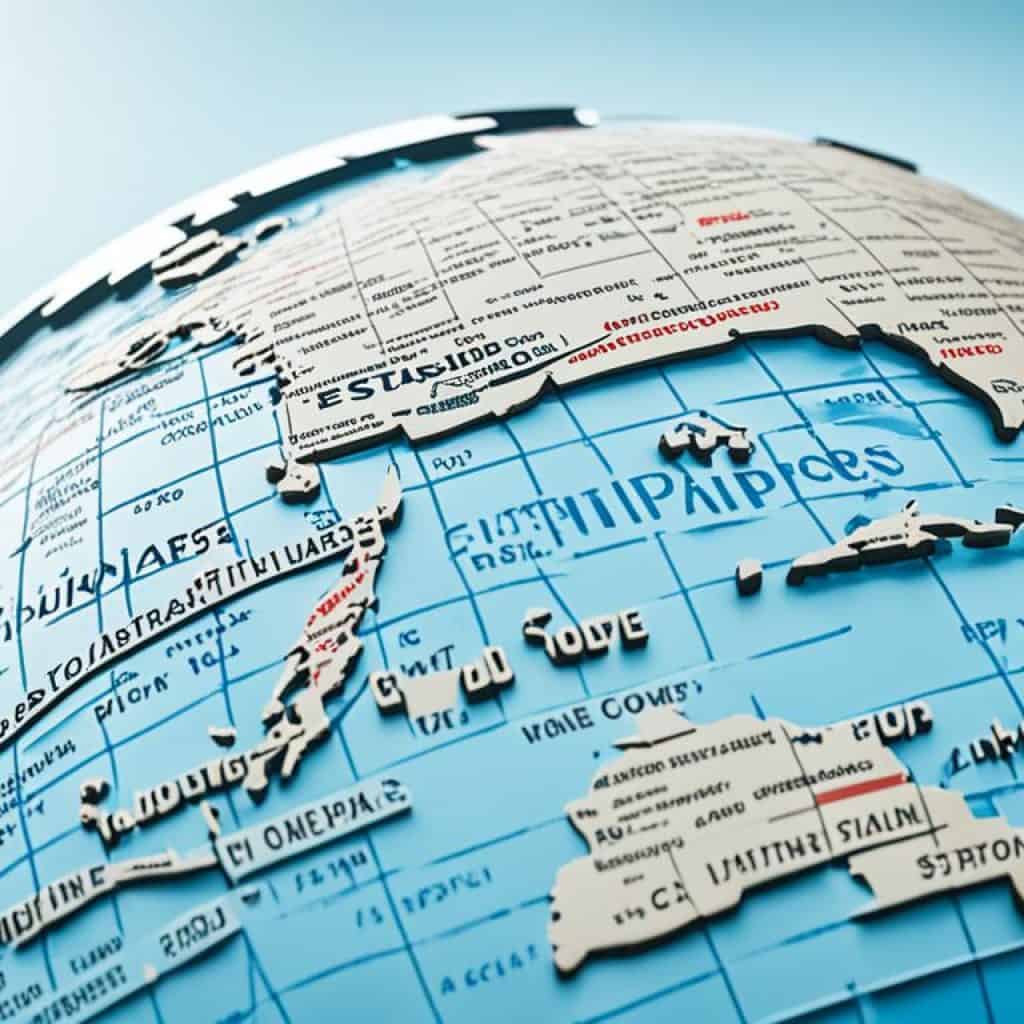Are you an expat living in the Philippines? Have you considered your health insurance options? Ensuring you have the right coverage is essential for your well-being and peace of mind. From international health insurance plans to the Filipino National Health Insurance System (PhilHealth), understanding the available options can be overwhelming. But don’t worry, we’ve got you covered.
In this article, we’ll explore the different healthcare options for expats in the Philippines, including the benefits and limitations of PhilHealth and private international health insurance. We’ll also discuss the healthcare system in the Philippines, the importance of having comprehensive coverage, and the best insurance companies for expats.
Key Takeaways:
- Health insurance in the Philippines can vary depending on location, with major cities having better healthcare facilities than rural areas.
- The Filipino National Health Insurance System, PhilHealth, provides free healthcare to Filipino citizens but may not cover all medical treatments and costs for expats.
- Private international health insurance plans, like those offered by Cigna Global Health Insurance and William Russell, offer comprehensive coverage tailored for expats living in the Philippines.
- Expats should consider the geographic differences in healthcare standards and the importance of having coverage that includes access to hospitals and clinics of their choice.
- Comparing different insurance companies and plans is crucial to finding the best fit for your needs as an expat in the Philippines.
Healthcare in the Philippines: An Overview
Healthcare in the Philippines varies in quality and accessibility across different regions. Major cities are known for their high healthcare standards and advanced facilities, while rural areas may lack basic healthcare amenities. Private hospitals are more prevalent than public hospitals, offering a wider range of medical services and specialized treatments. However, healthcare costs can be a burden for the average Filipino, especially in private healthcare settings. On the other hand, healthcare in the Philippines is generally more affordable for expats compared to their home countries.
Filipino medical professionals are highly skilled and competent, with many doctors and healthcare providers fluent in English. This language proficiency makes it easier for expats to communicate their healthcare needs and understand medical instructions. The Philippine government has also made efforts to improve healthcare access through the Universal Healthcare Bill, which aims to provide affordable healthcare for all citizens, especially those in remote areas and underserved communities.
Despite the disparities in healthcare facilities and standards, there are dedicated medical professionals in both public and private sectors who strive to provide quality healthcare services to all Filipinos and expats. With ongoing improvements to the healthcare system and the availability of private international health insurance plans, expats in the Philippines can access the medical care they need with peace of mind.
The Filipino National Health Insurance System: PhilHealth
PhilHealth, also known as the Filipino National Health Insurance System, is a government-funded healthcare program that provides free healthcare services to Filipino citizens. It aims to ensure that every Filipino has access to essential healthcare services without facing financial barriers. PhilHealth is funded through government subsidies, payroll deductions from employed individuals, and contributions from both individuals and companies.
Under PhilHealth, eligible individuals can avail themselves of various healthcare benefits, including coverage for emergency and urgent care, inpatient healthcare, and non-emergency surgeries. This enables Filipinos to receive the necessary medical treatments and procedures they require without incurring substantial out-of-pocket expenses.
However, it’s important to note that PhilHealth does not cover all medical treatments and costs. Some specialized procedures, elective surgeries, and certain medications may not be covered under the program. It’s advisable for individuals to carefully review the coverage and limitations of PhilHealth to ensure they have a clear understanding of the benefits they can avail themselves of.
In 2019, the Universal Healthcare Bill was signed into law, expanding the coverage of PhilHealth to include all citizens, regardless of their employment status. This means that even those who are not part of the workforce can benefit from the healthcare subsidies provided by the government.
PhilHealth Coverage Categories:
Under the Universal Healthcare Bill, PhilHealth has implemented different coverage categories based on the individual’s ability to pay premiums and their eligibility for government-sponsored healthcare subsidies. The categories are as follows:
- Direct Contributors: This category includes individuals who are employed and actively contribute to PhilHealth through monthly payroll deductions.
- Indirect Contributors: These are individuals who are sponsored by the government or social welfare organizations, such as senior citizens, veterans, and indigent members of society.
- Subsidized Members: This category includes individuals who are eligible for partial or full subsidies from the government to cover their PhilHealth premiums.
- Lifetime Members: These are individuals who have reached the age of 60 and have made at least 120 monthly contributions to PhilHealth. They are entitled to lifetime coverage without the need to pay additional premiums.
PhilHealth plays a crucial role in ensuring that Filipinos have access to essential healthcare services. However, it’s important to understand the limitations of the program and consider additional private health insurance options for more comprehensive coverage, especially for expats living in the Philippines.
Considerations for Expats in the Philippines
Living as an expat in the Philippines comes with unique considerations for healthcare. It is essential to understand the differences in healthcare standards between major cities and rural areas. While major cities boast higher quality healthcare, rural areas may have limited access to basic healthcare amenities.
Expats residing in rural areas should ensure that their insurance policies cover medical evacuations to neighboring countries with better healthcare facilities. This precaution can be a lifesaver in emergency situations where access to specialized medical care is required.
Private healthcare in the Philippines is known for its high quality. However, it’s important to note that private hospitals may require upfront cash payments. It is recommended that expats have comprehensive health coverage that includes access to hospitals and clinics of their choice.
Healthcare Standards
The healthcare standards in the Philippines can vary significantly depending on location, with major cities offering advanced facilities and better healthcare services compared to rural areas. It’s crucial for expats to consider this disparity when choosing their place of residence and evaluating their healthcare options.
Medical Evacuations
Medical emergencies can happen unexpectedly, and expats based in rural areas may face challenges in accessing specialized medical care. Having insurance coverage that includes medical evacuations to neighboring countries can provide expats with peace of mind and ensure timely access to the appropriate healthcare facilities.
Comprehensive Healthcare Coverage
Expats in the Philippines should prioritize having comprehensive health coverage to meet their healthcare needs. This includes coverage for hospitalizations, doctor visits, diagnostic tests, medications, and specialist consultations. By having comprehensive coverage, expats can have peace of mind knowing that they have access to a wide range of healthcare services.
| Considerations for Expats in the Philippines |
|---|
| Geographic differences in healthcare standards |
| Importance of medical evacuations for expats in rural areas |
| Need for comprehensive health coverage |
Health Insurance Options for Expats in the Philippines
Expats living in the Philippines have access to a range of health insurance options to ensure comprehensive coverage for their medical needs. International health insurance plans offered by reputable companies like Cigna Global Health Insurance and William Russell are designed specifically for expats living abroad.
These insurance plans provide extensive coverage that includes hospitalization, outpatient care, prescription medication, mental health services, and coverage for pre-existing conditions, offering expats peace of mind and financial protection in case of unforeseen medical expenses.
One of the key advantages of international health insurance is the flexibility it offers. Expats can choose plans that provide worldwide coverage or coverage limited to Southeast Asia, depending on their specific requirements. This flexibility ensures that expats have the freedom to seek medical treatment wherever they are in the world, including their home country, neighboring countries, or even within the Philippines.
When selecting an insurance plan, it is important for expats to carefully compare different insurance companies and plans to find the best fit for their needs. Consider factors such as coverage limits, deductibles, co-payments, and exclusions to ensure that the chosen plan offers the most comprehensive and suitable coverage.
Benefits of International Health Insurance for Expats in the Philippines
Here are some key benefits of international health insurance for expats living in the Philippines:
- Comprehensive Coverage: International health insurance plans provide extensive coverage for a wide range of healthcare services, ensuring that expats are protected against unexpected medical expenses.
- Flexibility: Expats have the flexibility to choose plans that offer worldwide coverage or coverage limited to specific regions, allowing them to access medical care wherever they are.
- Access to Trusted Healthcare Providers: Insurance plans often provide access to a network of trusted hospitals and doctors, ensuring that expats receive quality care from reputable healthcare providers.
- 24/7 Customer Support: Insurance companies typically offer round-the-clock customer support to assist expats with any questions or concerns they may have regarding their insurance coverage.
Choosing the right health insurance coverage is crucial for expats in the Philippines. By opting for international health insurance plans from reputable providers, expats can ensure that they receive comprehensive coverage and access to quality healthcare services wherever they may be.
Best Expat Insurance Companies in the Philippines
When it comes to securing reliable insurance coverage for expats in the Philippines, two standout options are Cigna Global Health Insurance and William Russell. These reputable insurance companies have a proven track record of catering to the unique needs of expatriates.
Cigna Global Health Insurance offers flexible plans that can be tailored to individual requirements. With their extensive network of trusted hospitals and doctors, expats can access quality healthcare services wherever they are in the Philippines. Cigna Global provides comprehensive coverage that includes hospitalization, outpatient care, prescription medications, mental health support, and coverage for pre-existing conditions.
William Russell, with over 30 years of experience in the healthcare industry, specializes in insurance plans that travel with expats wherever they go. Their plans provide comprehensive coverage and peace of mind by offering worldwide insurance protection. With William Russell, expats can enjoy access to a wide network of medical professionals and hospitals, ensuring quality healthcare services throughout their stay in the Philippines.
Why Choose Cigna Global Health Insurance and William Russell?
- Comprehensive coverage tailored for expats’ unique needs
- Flexible plans that can be customized to individual requirements
- Access to trusted hospitals and doctors
- Global coverage for seamless medical services worldwide
- Excellent customer service and support
Choosing the best insurance plan for your needs is crucial. By requesting insurance quotes from Cigna Global Health Insurance and William Russell, expats can compare coverage options and select the plan that suits them best. These reputable insurance companies ensure that expats in the Philippines have access to quality healthcare and comprehensive coverage, providing peace of mind during their time abroad.

Local Healthcare in the Philippines
The healthcare system in the Philippines consists of both public and private healthcare options. Public healthcare, supported by PhilHealth, provides healthcare services to the majority of the population. While public hospitals may have longer wait times, the doctors working in these hospitals generally speak excellent English, ensuring effective communication with expat patients.
Private healthcare is also available in the Philippines, with private hospitals offering high-quality healthcare services. Expats may find that healthcare costs in the Philippines are generally less expensive compared to North American and European countries, making private healthcare more accessible.
It is important to note that the public healthcare system in the Philippines may face challenges in terms of sufficient hospitals and clinics, resulting in limited access for the average citizen. However, expats can take advantage of the English-speaking doctors and healthcare facilities available in both public and private sectors.
Here is a comparison of public and private healthcare in the Philippines:
| Public Healthcare | Private Healthcare |
|---|---|
| Supported by PhilHealth | Accessible to expats |
| May have longer wait times | Shorter wait times |
| English-speaking doctors | English-speaking doctors |
| May have limited access | More options available |
Whether choosing public or private healthcare in the Philippines, it is important for expats to have comprehensive health insurance coverage that caters to their individual needs and provides financial protection in case of medical emergencies.
Health Insurance Enrollment for Expats in the Philippines
Enrolling in health insurance is crucial for expats living in the Philippines. It provides access to quality healthcare and ensures a comfortable hospital stay. Here’s what you need to know about health insurance enrollment:
- All expats employed in the Philippines must enroll in PhilHealth, the Filipino National Health Insurance System. Premiums are automatically deducted from their payrolls, providing coverage for medical treatments and costs.
- Expats who do not work for a major employer can still voluntarily enroll with PhilHealth if they have legal residency status. This voluntary enrollment allows them to enjoy the benefits of PhilHealth coverage.
- A limited number of foreign nationals, such as those married to Filipino citizens, are eligible to enroll in PhilHealth. This provides them with healthcare coverage while living in the Philippines.
- In addition to PhilHealth, many expats choose to carry private health insurance coverage. Private health insurance offers broader coverage options, including access to all hospitals and clinics, and ensures comprehensive healthcare protection.
By enrolling in health insurance, expats can alleviate the financial burden of medical expenses and receive quality healthcare services in the Philippines. It is essential to explore both PhilHealth and private health insurance options to find the most suitable coverage for your needs.
Private International Medical Insurance Plans for Expats in the Philippines
For expats in the Philippines, securing private international medical insurance is essential for comprehensive health coverage. These insurance plans offer worldwide coverage, ensuring that expats have access to medical services wherever they choose to receive care. Whether in the Philippines, a neighboring country, or their home country, expats can have peace of mind knowing that they are protected.
Private international medical insurance plans typically include a range of coverage options, ensuring that expats have access to the necessary healthcare services. These plans typically cover hospitalization, outpatient care, prescription medication, mental health, and pre-existing conditions. Expats can receive the care they need without worrying about the financial burden.
Two renowned insurance providers that offer international medical insurance plans for expats in the Philippines are Cigna Global Health Insurance and William Russell. These companies prioritize the well-being of expats and provide comprehensive health coverage suited to their unique needs. Expats can choose from a variety of plans offered by these providers to find the perfect fit for their healthcare requirements.

The Benefits of Private International Medical Insurance Plans
A private international medical insurance plan provides expats in the Philippines with numerous benefits:
- Comprehensive Health Cover: These plans offer extensive coverage for various healthcare services, ensuring that expats have access to the medical treatments they need.
- Worldwide Coverage: Expats can receive medical care anywhere in the world, providing flexibility and peace of mind.
- Hospitalization Coverage: Private international plans include coverage for hospital stays, safeguarding expats in case of emergencies or serious medical conditions.
- Outpatient Care: These plans cover outpatient treatments and consultations, ensuring that expats have access to necessary medical services without incurring significant expenses.
- Prescription Medication Coverage: Expats can receive coverage for prescription medications, allowing them to manage chronic conditions and access essential medications.
Expats can enjoy these benefits and more by choosing a private international medical insurance plan that suits their healthcare needs. The comprehensive coverage and worldwide access provided by these plans ensure that expats receive the best possible healthcare services, no matter where they are.
Comparing Cigna Global Health Insurance and William Russell
When selecting an international medical insurance plan, it’s essential to consider reputable providers like Cigna Global Health Insurance and William Russell. Let’s compare these two insurance companies:
| Insurance Provider | Key Features |
|---|---|
| Cigna Global Health Insurance |
|
| William Russell |
|
Both Cigna Global Health Insurance and William Russell offer exceptional insurance packages tailored to the unique needs of expats in the Philippines. By comparing the benefits and features of these providers, expats can make an informed decision and choose the plan that offers the most favorable coverage for their healthcare needs.
Best Health Insurance Companies for Americans in the Philippines
For Americans living in the Philippines, having reliable health insurance is crucial. One recommended health insurance plan is GeoBlue Xplorer, which offers global health insurance with outstanding benefits.
GeoBlue Xplorer provides coverage not only in the Philippines but also during international travel. This plan is perfect for US citizens residing in the Philippines for business, leisure, or study purposes, ensuring both health and financial security.
Key features of GeoBlue Xplorer include:
- Global Health Insurance: GeoBlue Xplorer offers coverage worldwide, providing peace of mind no matter where you are.
- Unlimited Policy Maximum: With no cap on policy benefits, you can access quality healthcare without worrying about limits.
- Premium Benefits: GeoBlue Xplorer offers comprehensive coverage for hospitalization, outpatient care, prescription medication, and more.
GeoBlue Xplorer also provides access to a trusted network of doctors and hospitals worldwide, ensuring that you receive top-quality healthcare services wherever you are. With coverage for up to six months of continuous travel outside of the US, this plan offers flexibility for those who frequently travel.
Investing in health insurance with GeoBlue Xplorer ensures that US citizens living in the Philippines have access to excellent healthcare facilities, allowing them to focus on enjoying their time in the country without worrying about medical expenses.
Routine Doctor Visits and Finding a Family Physician
When it comes to routine doctor visits in the Philippines, appointments are typically not necessary. Patients can conveniently show up during a doctor’s scheduled clinic hours and wait for their turn. This eliminates the need to plan and schedule appointments in advance, making access to healthcare more convenient for individuals.
However, it is important to note that wait times may be longer at public clinics and hospitals compared to private facilities. This is due to the higher demand for healthcare services in the public healthcare system. If time is of the essence or if you prefer shorter wait times, private healthcare facilities may be a more suitable option.
In the public healthcare system, primary healthcare centers are linked to peripheral barangay (local town) health centers. These primary healthcare centers serve as gateways, allowing individuals to register and avail the services of a local family physician. Having a family physician can be beneficial as they are familiar with your medical history, provide personalized care, and can assist with preventive healthcare measures.
When searching for a family physician in the Philippines, various factors can be considered. Recommendations from insurance providers, local friends, or other expats who have already found a reliable family physician can provide valuable insights. It is also recommended to consider the proximity of the healthcare facility to your place of residence, the physician’s qualifications and specialties, and the overall reputation of the healthcare provider.
For a streamlined approach to routine doctor visits and to have a trusted healthcare professional by your side, finding a dedicated family physician in the Philippines can provide peace of mind and ensure continuity of care.
Image:

Extra Things to Know Before Moving to the Philippines
The healthcare system in the Philippines is undergoing changes with the implementation of the Universal Healthcare Bill. While the country is working towards retaining more healthcare practitioners, the focus is still primarily on prescriptive rather than preventative medicine. Expats who prioritize wellness and a preventative medicine approach should discuss their preferences with their insurance representative to ensure their policy includes coverage for preventive care. It is important to stay informed about the evolving healthcare landscape in the Philippines and understand the coverage and benefits provided by your insurance policy.
Conclusion
Finding the right health insurance coverage is essential for expats living in the Philippines. Whether you choose the Filipino National Health Insurance System (PhilHealth) or opt for private international health insurance, it’s important to consider the healthcare standards in different regions, eligibility requirements, and benefits offered by insurance providers.
Cigna Global Health Insurance and William Russell are trusted insurance companies that offer comprehensive coverage tailored for expats in the Philippines. With their health insurance plans, you can have peace of mind knowing that you have access to quality healthcare services in the Philippines and beyond.
Take the necessary steps to secure the right health insurance that fits your needs. Whether you’re looking for expat insurance coverage, international health insurance, or medical insurance for expats, there are options available that provide health protection for overseas residents. Don’t compromise on your health and well-being while living abroad – ensure you have the right insurance coverage to safeguard your health.
FAQ
How does healthcare in the Philippines vary?
Healthcare in the Philippines varies from excellent to standard, with major cities having high healthcare standards and advanced facilities. However, rural areas may lack basic healthcare amenities.
What is PhilHealth and what does it cover?
PhilHealth is the Filipino National Health Insurance System that provides free healthcare to Filipino citizens. It covers emergency and urgent care, inpatient healthcare, and non-emergency surgeries, but it does not cover all medical treatments and costs.
What options are available for expats in terms of health insurance in the Philippines?
Expats in the Philippines have several options for health insurance coverage. They can choose to enroll in PhilHealth if they are employed or have legal residency status, or they can opt for private international health insurance plans that provide comprehensive coverage tailored for expats living in the Philippines.
Which insurance companies are recommended for expats in the Philippines?
Cigna Global Health Insurance and William Russell are two recommended insurance companies for expats in the Philippines. These providers offer comprehensive coverage and excellent customer service.
How does the public healthcare system in the Philippines compare to private healthcare?
The public healthcare system in the Philippines is supported by PhilHealth and provides healthcare services to the majority of the population. Private healthcare is also available, with private hospitals offering high-quality services. Expats may find that healthcare costs in the Philippines are generally less expensive compared to North American and European countries.
Who is eligible to enroll in PhilHealth?
All expats employed in the Philippines are required to enroll in PhilHealth and have premiums automatically deducted from their payrolls. Expats who do not work for a major employer can also voluntarily enroll with PhilHealth if they have legal residency status.
What do international health insurance plans for expats in the Philippines typically cover?
International health insurance plans for expats in the Philippines typically include coverage for hospitalization, outpatient care, prescription medication, mental health, and pre-existing conditions. These plans provide worldwide coverage and can be tailored to individual needs.
Is there a recommended health insurance plan for Americans living in the Philippines?
GeoBlue Xplorer is a recommended health insurance plan for Americans living in the Philippines. It offers global health insurance with an unlimited policy maximum and premium benefits.
How can expats find a family physician in the Philippines?
Routine doctor visits in the Philippines do not typically require appointments. Patients can show up during a doctor’s scheduled clinic hours and wait for their turn. In the public healthcare system, primary healthcare centers are linked to peripheral barangay (local town) health centers, where individuals can register for a local family physician.
What should expats know about the healthcare system in the Philippines before moving there?
The healthcare system in the Philippines is undergoing changes with the implementation of the Universal Healthcare Bill. Expats who prioritize wellness and a preventative medicine approach should discuss their preferences with their insurance representative to ensure their policy includes coverage for preventive care.
Note: The FAQ section should be positioned at the end of the article after the conclusion. Ensure proper punctuation and grammar throughout the answers.
Source Links
- https://www.internationalinsurance.com/health/asia/philippines.php
- https://expatfinancial.com/healthcare-information-by-region/southeast-asia-healthcare-system-and-insurance-options-for-expats/philippines-healthcare-system-medical-insurance-options-for-expats/
- https://www.william-russell.com/blog/health-insurance-in-the-philippines/


















Add comment